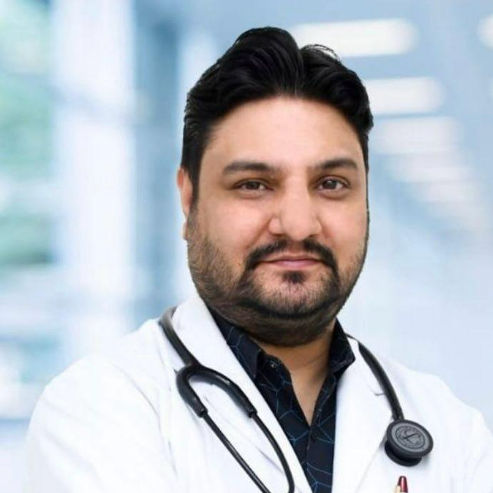Proctitis Overview of Symptoms and Treatments
Know all about proctitis, what it is, common symptoms, causes, diagnosis and treatment options.

Written by Dr. Md Yusuf Shareef
Reviewed by Dr. D Bhanu Prakash MBBS, AFIH, Advanced certificate in critical care medicine, Fellowship in critical care medicine
Last updated on 13th Jan, 2026

Proctitis is a condition that affects the rectum, causing inflammation and discomfort. While it may sound intimidating, understanding its symptoms, causes, and treatment options can help you manage it effectively. If you or someone you know is experiencing rectal discomfort, this guide will provide helpful insights and practical advice.
What is Proctitis?
Proctitis is the inflammation of the lining of the rectum, the lower part of the large intestine that connects to the anus. This inflammation can lead to pain, bleeding, and other uncomfortable symptoms. It can be acute (short-term) or chronic (long-lasting), depending on the cause.
Consult a Gastroenterologist for Personalised Advice
Common Symptoms of Proctitis
The symptoms of proctitis can vary from mild to severe. Some common signs include:
• Rectal pain or discomfort – A constant or intermittent ache in the rectal area.
• Bleeding – Bright red blood in the stool or on toilet paper.
• Mucus discharge – A sticky, white, or yellowish discharge from the rectum.
• Diarrhoea or constipation – Changes in bowel movements.
• Urgency to pass stool – Feeling the need to go frequently, even when the bowel is empty.
• Pain during bowel movements – Discomfort or burning sensation while passing stool.
If you notice any of these symptoms, it’s important to consult a doctor for proper diagnosis and treatment.
What Causes Proctitis?
Several factors can lead to proctitis, including:
1. Infections – Bacterial (like salmonella or E. coli), viral (such as herpes or HPV), or sexually transmitted infections (like gonorrhea or chlamydia) can cause inflammation.
2. Inflammatory Bowel Disease (IBD) – Conditions like ulcerative colitis or Crohn’s disease often affect the rectum.
3. Radiation Therapy – Patients undergoing radiation for pelvic cancers (like prostate or cervical cancer) may develop radiation proctitis.
4. Autoimmune Reactions – Sometimes, the body’s immune system mistakenly attacks the rectal lining.
5. Trauma or Injury – Anal intercourse, enemas, or foreign objects can irritate the rectum.
6. Food Sensitivities – Certain foods may trigger inflammation in sensitive individuals.
How is Proctitis Diagnosed?
If you experience symptoms, your doctor may recommend:
• Physical Examination – Checking for tenderness, swelling, or discharge.
• Stool Tests – To detect infections or blood.
• Blood Tests – To identify infections or inflammatory markers.
• Sigmoidoscopy/Colonoscopy – A thin, flexible tube with a camera examines the rectum and colon.
• Biopsy – A small tissue sample may be taken for further testing.
Early diagnosis helps in managing symptoms effectively and preventing complications.
Get Your Health Assessed
Treatment Options for Proctitis
Treatment depends on the underlying cause:
1. Medications
• Antibiotics/Antivirals – For infections like STIs or bacterial proctitis.
• Anti-inflammatory Drugs – Such as corticosteroids or mesalamine for IBD-related proctitis.
• Pain Relievers – To ease discomfort (avoid NSAIDs if bleeding is present).
2. Lifestyle & Dietary Changes
• High-Fibre Diet – Helps regulate bowel movements (whole grains, fruits, vegetables).
• Hydration – Drinking plenty of water prevents constipation.
• Avoid Irritants – Spicy foods, caffeine, alcohol, and dairy may worsen symptoms.
• Sitz Baths – Warm water soaks can relieve pain and inflammation.
3. Radiation Proctitis Management
• Topical Treatments – Sucralfate or steroid enemas to reduce inflammation.
• Laser Therapy – For severe bleeding or ulcers.
4. Surgical Options (Rare Cases)
• If medications and lifestyle changes don’t help, surgery may be needed to remove damaged tissue.
When to See a Doctor?
Seek medical help if you experience:
• Persistent rectal bleeding
• Severe pain or fever
• Unexplained weight loss
• Symptoms lasting more than a few days
Early intervention prevents complications like chronic pain, anaemia, or fistulas.
Can Proctitis Be Prevented?
While not all cases are preventable, you can reduce risks by:
• Practising safe sex to avoid STIs.
• Eating a balanced, fibre-rich diet.
• Avoiding excessive use of laxatives or enemas.
• Following medical advice if you have IBD or undergo radiation therapy.
Final Thoughts
Proctitis can be uncomfortable, but with the right treatment and lifestyle adjustments, most people recover well. If you’re experiencing symptoms, don’t hesitate to consult a healthcare provider for personalised care.
Consult a Gastroenterologist for Personalised Advice
Consult a Gastroenterologist for Personalised Advice

Dr Piyush Vishwakarma
Gastroenterology/gi Medicine Specialist
11 Years • MBBS, MD, DrNB,
Delhi
Apollo Hospitals Indraprastha, Delhi

Dr. Vipul Worah
Gastroenterology/gi Medicine Specialist
29 Years • MBBS, MD (Med.),DM (Gastro)
Ahmedabad
Apollo Hospitals Gandhinagar, Ahmedabad

Dr. Soham Doshi
Gastroenterology/gi Medicine Specialist
8 Years • MD medicine DNB Gastroenterology fellowship in Liver Transplant
Nashik
Apollo Hospitals Nashik, Nashik

Dr. Sunil Kaul
General Surgeon
30 Years • MBBS, MS, FICS, FIMSA, FMAS
Delhi
Apollo Hospitals Indraprastha, Delhi
(25+ Patients)

Dr. Amit Pandita
Gastroenterology/gi Medicine Specialist
10 Years • MBBS. MD (INTERNAL MEDICINE) DrNB (GASTROENTEROLOGY AND HEPATOLOGY)
Delhi
Apollo Hospitals Indraprastha, Delhi
Consult a Gastroenterologist for Personalised Advice

Dr Piyush Vishwakarma
Gastroenterology/gi Medicine Specialist
11 Years • MBBS, MD, DrNB,
Delhi
Apollo Hospitals Indraprastha, Delhi

Dr. Vipul Worah
Gastroenterology/gi Medicine Specialist
29 Years • MBBS, MD (Med.),DM (Gastro)
Ahmedabad
Apollo Hospitals Gandhinagar, Ahmedabad

Dr. Soham Doshi
Gastroenterology/gi Medicine Specialist
8 Years • MD medicine DNB Gastroenterology fellowship in Liver Transplant
Nashik
Apollo Hospitals Nashik, Nashik

Dr. Sunil Kaul
General Surgeon
30 Years • MBBS, MS, FICS, FIMSA, FMAS
Delhi
Apollo Hospitals Indraprastha, Delhi
(25+ Patients)

Dr. Amit Pandita
Gastroenterology/gi Medicine Specialist
10 Years • MBBS. MD (INTERNAL MEDICINE) DrNB (GASTROENTEROLOGY AND HEPATOLOGY)
Delhi
Apollo Hospitals Indraprastha, Delhi
